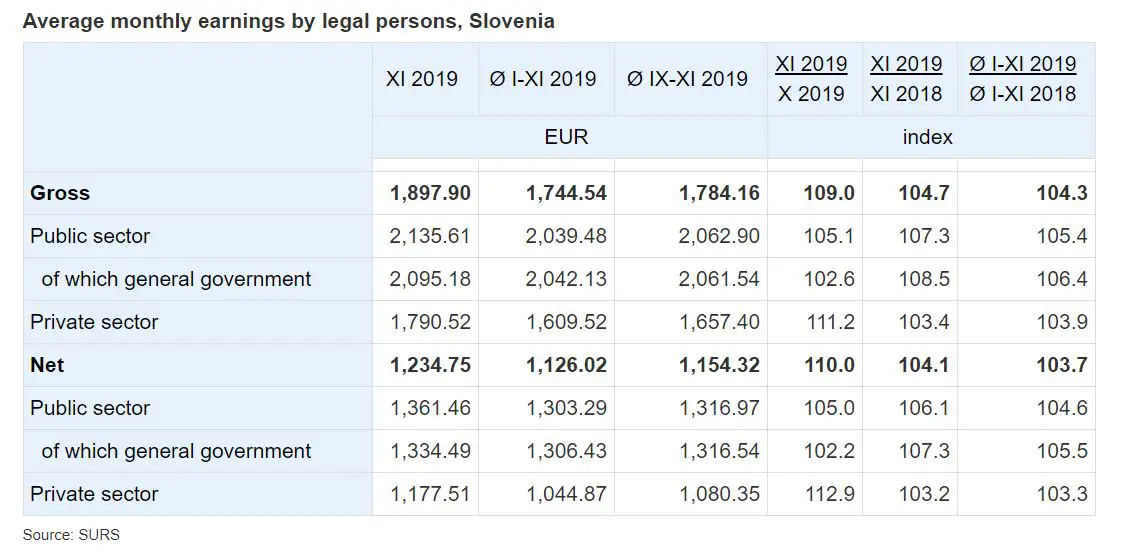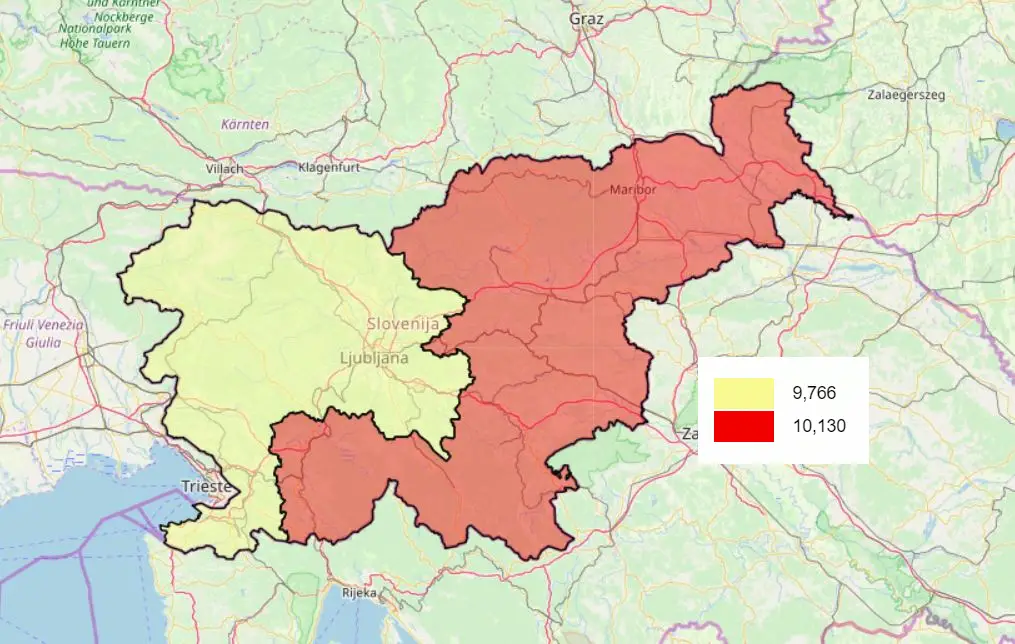News
The stories about King Matjaž are part of oral tradition, and the main narrative about the good king goes as follows. King Matjaž and his goodness towards his subjects got him into a conflict with nobility, who eventually went after him and cornered him by Mount Peca. The mountain opened and gave The King a place to hide. Inside the mountain Matjaž fell asleep at a stone table and when his growing beard turns nine times around the table, he will wake up and good times will return to Carinthia (Koroška). Oh, and he had a wife, Alenčica, who had been kidnapped by a Turkish Sultan, so Matjaž goes and sets her free by dressing up as a Turk.
Every year, and this will be the 28th time, the municipality of Črna na Koroškem organizes a King Matjaž inspired weekend event, with a snow castle building competition as the focus. Since the website is only in Slovenian and German, we provide some basic information in English below.
The three-day event begins on Friday night, with a night slalom between torches for the King Matjaž Cup at the ski resort in Črna, Carinthia.
The main event, which will take place on Matevžavi Travniki uder Stadion in the Centre of Črna na Koroškem, is a Saturday competition of teams in the construction of snow castles and snow sculptures thematically related to the legend of King Matjaž. Each year's construction is accompanied by an entertaining cultural program (presentation of teams, selection of Alenčica, lighting of torches and candles, fiery performance, solemn arrival of King Matjaž, best team awards, musical performances, etc.). The all day fairytale happenings will culminate with the lighting of the snow castle torches in the evening.
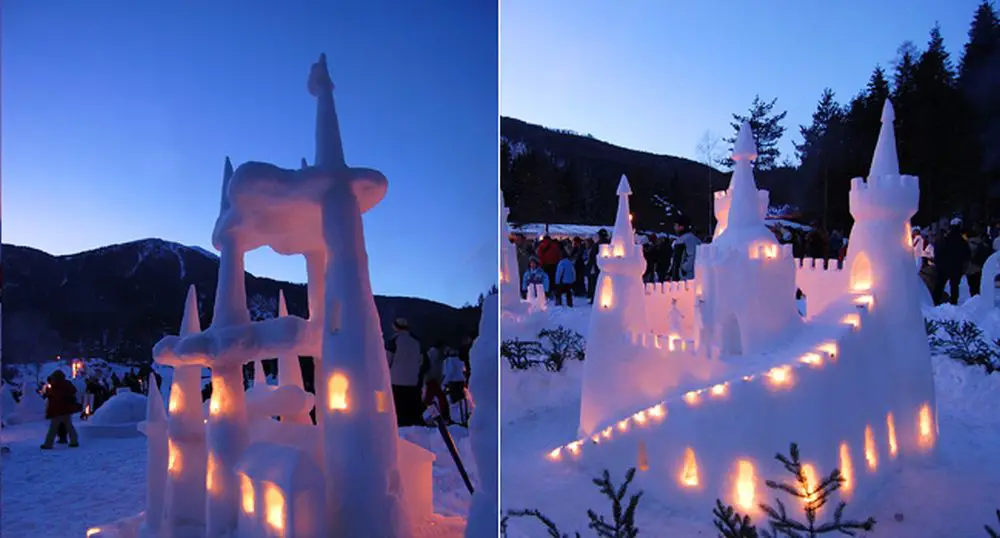
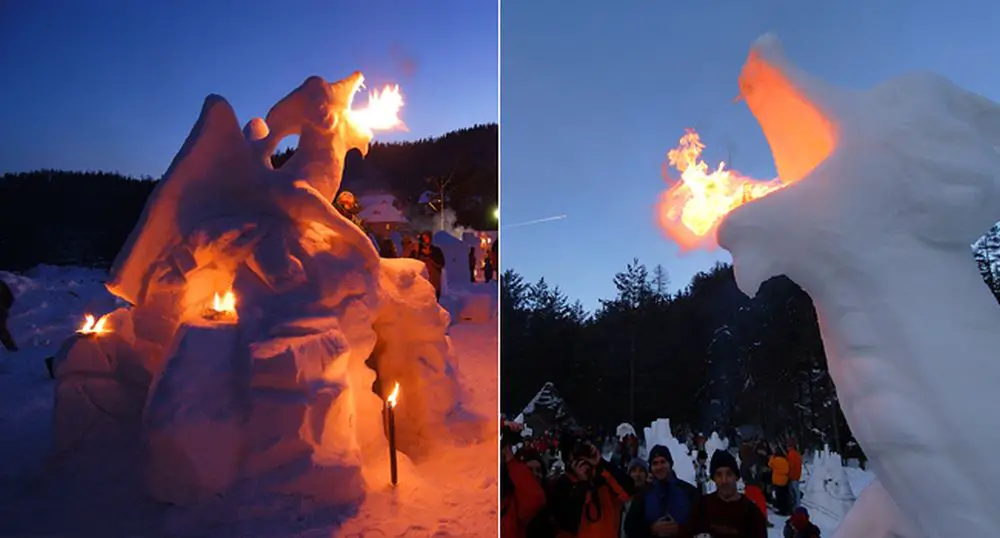
Sunday is the day reserved for children, with activity programs, puppet shows, songs, a search for hidden treasure, horseback riding and more. On Sunday, awards are presented for the best fine art and literary works on the subject of King Matjaž, created by pupils of Slovenian elementary schools.
Entrance fees for visitors on Saturday:
Children under 8 – free of charge, children aged 8 – 15: €2.5, adults: €5.
Entrance fee for visitors on Sunday:
Children under 15: free of charge, older than 15: €5.
Registration and fees for castle building teams (5-8 members):
The registration fee is €11 per group member
Registration is possible until January 25, 2002 until 9AM at the place of the event or with an online form.
At the registration point every team collects their lunch vouchers and trash bags, and places a plan of their castle on the pole with the number of their building plot. Only natural materials are allowed to be used (snow water, ice and rods) and people should bring their own construction tools.
With Adria Airways assets due to be auctioned next week, at 11:00 on Thursday 23 January, Ex-Yu Aviation reports that a group of unnamed Russian investors are interested in purchasing the collapsed airline’s Air Operators Certificate (AOC) and reviving the name to run services within Europe, using Sukhoi Superjet 100 aircraft. As reported earlier on TSN, the starting price for Adria’s assets, which include various training manuals in addition to the AOC, has been set at €45,000. However, a new owner would need to take on a number of obligations that remain after the carrier’s bankruptcy.
The airline’s previous owner, the Luxembourg-based German fund 4k Invest, purchased Adria from the Slovenian government in 2016 for €100,000. Since Adria’s collapse in 2019 an investigation into the role of 4K Invest and possible mismanagement has been launched, although the fund’s decision to liquidate its assets is complicating this.
While the closure of the national carrier lead to a 60% fall in Slovenia’s international seat capacity, a number of airlines have stepped in to fill the more profitable gaps in the schedule, while the Slovenian government is said to be in talks with regard to subsidising some other routes.
STA, 15 January 2020 - Slovenia's average net pay for November was EUR 1,235, up by 10% in nominal terms and 9.9% in real terms compared to October and by 4.1% nominally year-on-year. The surge was due to extra payments at the end of year, such as Christmas and performance bonuses, shows the Statistics Office data released on Wednesday.
Meanwhile, the average gross pay rose by 9% nominally to EUR 1,898, up 8.9% in real terms compared to October.
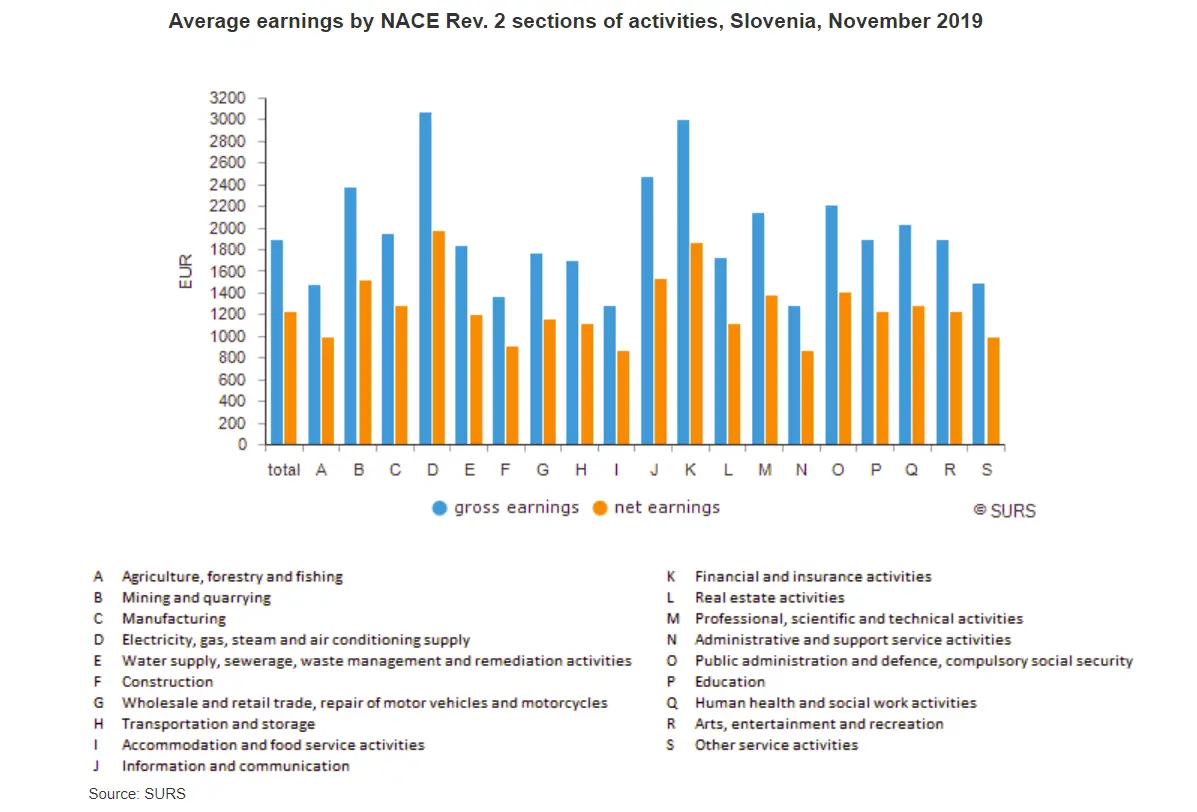
The average gross extra payment in November amounted to EUR 724, with around 23% of employees receiving the sum, mostly level with 2018.
The November average net salary increased by 2.7% in real terms year-on-year. At a monthly level, the figure grew both in the private sector (+13%) and public sector (+5%), increasing the most in financial and insurance business (+24%).
Moreover, the average net pay for November grew in the electricity, gas and steam sector (+24%), where it was the highest (EUR 1,975), and in manufacturing (+17%).
You can learn more about the images on Slovenia’s euro coins here: Slovenia in your pocket – coins that celebrate the culture
STA, 14 January 2020 - The Simon Wiesenthal Center, a human rights organisation researching the Holocaust, on Tuesday criticized the recent decision by the Slovenian Supreme Court to annul the 1946 conviction of Leon Rupnik, who headed the Provisional Government of the Nazi-occupied Province of Ljubljana.
In a letter sent to the Slovenian ambassador in Israel, the organisation said the "notorious anti-Semite" had played "a major role in the arrest and deportation of Jews from Ljubljana in 1943 and 1944" and actively participated in Holocaust crimes.
"This shameful decision constitutes a shocking distortion of the history of the Holocaust and a horrific insult to Rupnik's many victims and their families, the centre's director of Eastern European Affairs Efraim Zuroff said.
"We kindly request that you promptly convey our protest to the pertinent Slovenian authorities so that the proper measures can be taken to undo the enormous damage wrought by this unjust decision of the Slovenian Supreme Court," he said according to a press release published on the organisation's web page.
The Jewish Cultural Centre Ljubljana responded to the Supreme Court's decision last week with "indignation and concern", saying that it was the "first step in the politically-motivated aspiration to rehabilitate the criminal collaborationist regime during WWII".
After annulling the Rupnik verdict, the Supreme Court ordered a retrial, but since it is impossible under Slovenian law to try a dead person - Rupnik was court-martialled and executed for treason in 1946 - the most likely outcome seems to be a termination of procedure.
You can see videos of Leon Rupnik as the main speaker at a pro-Nazi rally in the centre of Ljubljana, saluting a Nazi flag, below
More on this story can be found here
STA, 14 January 2020 - The Slovenian men's handball team made it to the main round of the European Championship featuring the best 12 teams at the tournament after winning all three matches in the preliminary round, including against the hosts Sweden.
Slovenia opened the tournament in Group F in Sweden's Gothenburg last Friday by beating Poland 26:23, and followed the win up with a tough 21:19 victory against the Swedes on Sunday.
The cherry on the top was today's win against Switzerland, with Slovenia easily cruising past the Swiss for a 29:25 win and a perfect 3:0 score at the tournament under the new head coach Ljubomir Vranješ.
Vranješ said that the liked that the players "showed character", including the younger and lesser used players, which showed that "we have breadth in the team" and was important mentally and when it came to the playing form.
In the main round, Slovenia will play in Group II in Malmö and start the four-game phase on Friday and finish it on 22 January. The top two teams from each of the main round groups will make it to the semi-finals in Stockholm.
"I always want to win, and the players do too, and of course we had thought we would advance," the coach said, adding that "we have done a fantastic job in Gothenburg and now we are going to Malmö."
At the tournament co-hosted by Austria and Norway, Slovenia are also looking to secure a berth at the 2020 Summer Olympics in Tokyo or a slot at one of the three Olympic qualifying tournaments.
Only the Euro winner will secure a berth at the 2020 Summer Olympics. If the winner is Denmark, who have already won a ticket for Tokyo by winning the latest world championship, the runner-up will also secure an Olympic berth.
Another path to Tokyo is via three qualifying tournaments, hosted by France, Germany and Norway between 17 and 19 April, with two teams to qualify from each.
Sweden, Croatia and Spain have secured the appearance at the tournaments, and another two slots are open for European teams. Slovenia could secure a slot depending on their result at the championship.
Check the date at the top of the page, and you can find all the "morning headlines" stories here. You can also follow us on Facebook and get all the news in your feed.
A schedule of all the main events involving Slovenia this week can be found here
This summary is provided by the STA:
Ruling parties deny talks on alternative coalition
LJUBLJANA - The partners in the coalition led by the Marjan Šarec List (LMŠ) - SMC, SAB, SD and DeSUS - denied speculations that tentative talks are already under way on the formation of possible alternative coalition after Janez Janša, the leader of the opposition SDS, said that such talks were already ongoing. The coalition is nevertheless in a precarious position, as DeSUS holds an election congress on Saturday and PM Šarec has indirectly backed an opponent of the current party president. DeSUS deputy group leader Franc Jurša said Šarec "may be opening too many fronts at once".
Wiesenthal Center slams voiding of collaborationist general's conviction
JERUSALEM, Israel - The Simon Wiesenthal Center criticized the recent decision by the Slovenian Supreme Court to annul the 1946 conviction of Leon Rupnik, who headed the Provisional Government of the Nazi-occupied Province of Ljubljana. In a letter sent to the Slovenian ambassador in Israel, the organisation said the "notorious anti-Semite" had played "a major role in the arrest and deportation of Jews from Ljubljana in 1943 and 1944". It said the "shameful decision constitutes a shocking distortion of the history of the Holocaust and a horrific insult to Rupnik's many victims and their families."
Disabled claim EUR 53m in damages over lack of voter access
LJUBLJANA - The European Court of Human Rights Court has admitted an application by two disabled persons in wheelchairs who are suing Slovenia over lack of proper accessibility to polling stations and voting. The jurist that co-wrote their application, Jurij Toplak, says that given the case law Slovenia is expected to be ordered to pay EUR 3,000 to each disabled. For the same reason, the Association for the Rights of the Disabled claims EUR 54 million from the state, or else it will bring a class action lawsuit.
First repatriates from Venezuela arrive in Slovenia
LJUBLJANA - The Government Office for Slovenians Abroad confirmed that the first Venezuelans of Slovenian descent had arrived in Slovenia at the start of the largest repatriation project in the country prompted by the Venezuela crisis. The office would not reveal any details, but the newspaper Dnevnik reported that a family of four and a married couple had arrived from Venezuela. The government has set aside EUR 1.2 million for the project with 53 persons so far applying for resettlement.
NBI boss: Fighting crime should adapt faster to new technologies
LJUBLJANA - Darko Muženič, director of the National Bureau of Investigation (NBI), does not think there are untouchables in Slovenia, but he does think that procedures are taking too long. He told the STA in an interview that crime investigation and prosecution should adapt to globalisation and new technologies to keep up with offenders. Muženič would like to staff up the bureau, mainly with operational analysts and computer forensic specialists. One of his priorities is cracking down on money laundering, while he also notes insufficient awareness about the damage caused by financial crime.
Cerar attends Green Group ministerial in Abu Dhabi
ABU DHABI, UAE - Foreign Minister Miro Cerar attended a ministerial of the Slovenian-sponsored Green Group initiative to discuss preparations for the Expo 2020 Dubai, where Slovenia's presentation will revolve around innovative sustainable development practices under the slogan Green Smart Experience. He also held a bilateral meeting with his Emirati counterpart Abdullah bin Zayed Al Nahyan and and Thani Ahmed Al-Zeyoudi, the minister of climate change and environment.
NGO launches anti-hate speech campaign
LJUBLJANA - A media literacy NGO launched a campaign to draw attention to the funding of media outlets which it says spread hate and intolerance by means of public funds. Until the end of the year, Državljan D (Citizen D) will organise debates on the topic in 16 towns around the country. The NGO head Domen Savič said one of the main sources of hate speech was "the media united into a Western Balkan network of propaganda factories" indirectly managed by Hungarian Prime Minister Viktor Orban.
Guilty verdict of radiologist Milošević statute-barred
LJUBLJANA - A higher court threw out the guilty verdict of radiologist Zoran Milošević over bribery because the case has become statute-barred following an appeal. Milošević, the chief defendant in a separate trial relating to the biggest health corruption case in the country's history, had received a suspended prison sentence of ten months for accepting a EUR 7,200 bribe in exchange for making sure the country's largest hospital chose a specific company Animus as the supplier of a medicinal device.
Semenič wins Blue Bird prize for youth novel
LJUBLJANA - The acclaimed playwright Simona Semenič won the Blue Bird Prize for the best as yet unpublished youth novel for her work "Skrivno Društvo KRVZ" (KRVZ Secret Society), set to be released in April. It tells the story of a group of friends and their adventures including dragons and secret maps. Semenič will also receive EUR 10,000 that comes with what the prize, conferred by publisher Mladinska Knjiga biennially for designated genres.
Handballers enter main round at Euro undefeated
GOTHENBURG, Sweden - The Slovenian men's handball team made it to the main round of the European Championship featuring the best 12 teams at the tournament after winning all three matches in the preliminary round. The easy 29:25 win against Switzerland came after Slovenia opened the tournament in Group F by beating Poland 26:23, and followed the win up with a tough 21:19 victory against the Swedes. Head coach Ljubomir Vranješ said the players "showed character", including the younger and lesser used players, which showed that "we have breadth in the team".
Jakupović falls victim to Melbourne air
LJUBLJANA - Slovenian tennis player Dalila Jakupović started the Australia Open qualifying tournament on Tuesday, but conceded after leading the match against Switzerland's Stefanie Vögele 6-4, 5-6 due to uncontrollable coughing and breathing difficulties, likely caused by smoke and air pollution from the bush fires. It is yet unclear whether her coughing fit was directly linked to fires wreaking havoc on air quality, but many players and coaches urged the organisers to postpone the qualifiers.
Slovenian highlands inhabited more than 2,500 years ago
BOHINJ - Archaeologists have unearthed new evidence showing that the Slovenian Alps were inhabited earlier than 2,500 years ago. It is thought Iron Age people were breeding cattle and mining iron ore in the area. The findings were made last year during excavations at the Bošinka Plateau in the Triglav mountain range, which turned up the foundations of a hut and a number of tiny objects such as pot shards and clothing fasteners. A charcoal sample dated in to the early Iron Age.
Visiting Ljubljana? Check out what's on this week, while all our stories on Slovenia, from newest to oldest, are here
If you're learning Slovenian then you can find all our dual texts here
Ever wondered where all the second homes are in Slovenia, the vikendi and those defined by the Statistical Office of the Republic of Slovenia (Statistični urad Republike Slovenije – SURS) as “dwellings reserved for seasonal and secondary use”? If so, wonder no more as we zoom in the data for 2018, the most recent year for which it’s available.
According to SURS, in 2018 there were a total of 19,896 such dwellings in Slovenia. Of these, 9,766 (49%) were in the west, and 10,130 (51%) in the east.
But that scale, the two “cohesion regions”, hides a lot of detail, and if we look at the 12 statistical regions then something become clear: that Gorenjska (AKA Upper Carniola) seems to be the most desired location, with 3,376 holiday homes, or just under 17% of the total, as seen in the following map and table.
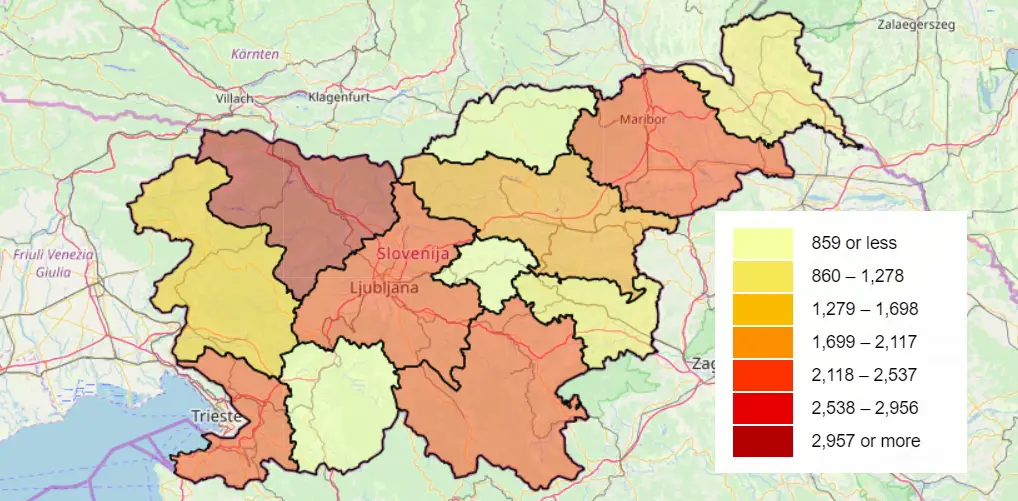
| Slovene | English | # | % |
| Gorenjska | Upper Carniola | 3,376 | 5.22 |
| Osrednjeslovenska | Central Slovenia | 2,489 | 12.51 |
| Obalno-Kraška | Coastal–Karst | 2,333 | 11.73 |
| Jugovzhodna Slovenija | Southeast Slovenia | 2,324 | 11.68 |
| Podravska | Drava | 2,168 | 10.90 |
| Savinjska | Savinja | 2,078 | 10.44 |
| Goriška | Gorizia | 1,568 | 7.88 |
| Posavska | Lower Sava | 1,037 | 5.21 |
| Pomurksa | Mura | 988 | 4.97 |
| Koroška | Carinthia | 650 | 3.27 |
| Zasavska | Central Sava | 446 | 2.24 |
| Primorsko-Notranjska | Littoral–Inner Carniola | 439 | 2.21 |
And the most popular place to buy a holiday home in Slovenia is...
Now zooming in to the highest level of detail that SURS offers – the 212 municipalities – we can see that there are seven areas where there are more than 500 holiday homes: Piran (1,038), Kranjska gora (961), Bohinj (843), Bovec (608), Brežice (526), Ljubljana (523), and Izola (512). You can visit an internactive version of the map below here and learn more, if wanted, while if you’re interested in more statistics about Slovenia then all our related stories are here.
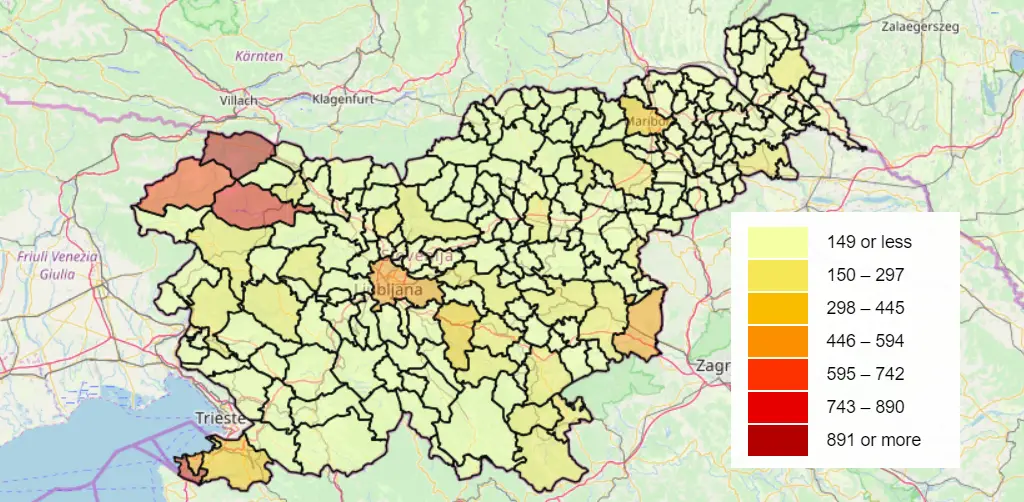
If you’re curious about some of the homes on the market, then check our real estate section, while all our stories on property are here.
STA, 14 January 2020 - Darko Muženič, the director of the National Bureau of Investigation (NBI; Nacionalnega preiskovalnega urada - NPU), does not think there are untouchables in Slovenia, but he does think that procedures are taking too long. He also told the STA in an interview that crime investigation and prosecution should adapt to globalisation and new technologies.
In the ten years since its inception, the NBI has handled 1,100 criminal offences, filing 796 criminal complaints for criminal acts that netted a total of EUR 1.048 billion in illegal proceeds.
Calling the decision to establish the bureau visionary, Muženič says that the NBI can respond nation-wide any time and any place with all resources.
The staff includes 58 fully operative investigators, but Muženič would like to staff the bureau up, mainly with operational analysts and computer forensic specialists.
The NBI is looking for experienced crime investigators with specialist expertise to keep abreast with offenders, who use advanced technologies, virtual currencies, and even transport drugs by submarines.
"They are always in step with technological advances to cover up their activities," says Muženič, so he does not think it possible for the law enforcement to work the same way as it did 50 years ago.
The NBI cannot attract staff with wages alone. "People who come to work with us want to investigate crime and do something good," says Muženič, a former crime investigator himself.
He believes that criminal procedures in Slovenia are taking too long, wondering whether sanctions are still effective if conviction follows several years after the crime is first discovered.
He offered Italy as a good example of fast prosecution of corporate crime. "Remember the Parmalat financial fraud scandal? From detection of the crime (...) to conviction and confiscation of property, it took two years. The recent first-instance conviction in the Hypo case in Slovenia followed seven years after the criminal complaint."
Moreover, vehicles confiscated in Italy are made available to public services such as police or social services, while in Slovenia impounded vehicles "are kept stored until all procedures are concluded".
The NBI last year sought temporary seizure of assets as security against illegal proceeds in the amount of EUR 115 million.
Muženič also believes that there is still too little awareness in Slovenia about the damage financial crime causes to the country.
"In the US someone who willingly cheats employees and fails to pay tax is sent to prison for 40 years. In Slovenia such procedures take 10 to 15 years or may even become statute barred."
If failure to pay tax is seen as a sin abroad, it is still seen as being resourceful in Slovenia. "The problem is people's mentality."
Muženič lauded cooperation between the NBI, police crime investigation divisions and the Financial Administration, as well as other state bodies, but noted that resolving corporate crime takes time.
It is lengthy procedures in the past that may have caused the impression in public that there are people who are untouchable for the hand of justice, but he does not think this is true.
Muženič also notes the public misconception that someone who is subject to a house search, for example, must be guilty. This is why he disagrees with media presence during house searches.
"It's also true that when we opt for a house search, we are almost hundred percent sure that the person under investigation is also the perpetrator.
"When we draw up a complaint, we justify why we believe the suspect committed the crime. However, the court has the final say, deliberates whether evidence and our grounding are consistent enough to prove guilt."
Muženič, who took over at the NBI a few months ago having previously served as the head of the Office for Money Laundering Prevention, has made crack-down on money laundering and corruption one of his priorities.
"We don't have big international corporations, professional money launders as they have abroad. It's all done on a smaller scale, but still considerable considering the country's size."
Even though there is not much talk about that in public, the police are working on these crimes, he says.
When it comes to money laundering, Slovenia has a robust preventive system, legislation aligned with the EU, and financial institutions have good systems to detect deviations.
As one of its strategic priorities, the NBI also monitors developments in public investment projects. However, Muženič says that mainly prevention is important when it comes to public tenders.
"Procedures must be conducted transparently and so as to detect flaws on time and notify those in charge. It is the job of those who run public contracting and of effective legislation."
STA, 14 January 2020 - Slovenian tennis player Dalila Jakupović started the Australian Open qualifying tournament on Tuesday, but conceded after leading the match 6-4, 5-6 due to uncontrollable coughing and breathing difficulties, likely caused by smoke and air pollution from the continent's fires.
It is yet unclear whether her coughing fit was directly linked to fires wreaking havoc with the air quality, but many tennis players and coaches urged the organisers to postpone the matches.
After her retirement from the match with Switzerland's Stefanie Vögele, Jakupović told the press she was indeed having problems due to the polluted air.
"I think it's not fair to us, the players, besides, it's definitely not healthy," the 28-year-old said, adding she was shocked upon finding out the qualifying matches would go on today.
She highlighted that the organisers still had plenty of time until the tournament's start. "It was really bad. I've never experienced anything like it and I was quite scared. I was afraid of losing consciousness and falling down. That's why I dropped to my knees. I couldn't walk anymore," said Jakupović, who persisted playing for almost two hours.
Similar problems occurred during a match between Slovenian tennis player Blaž Kavčič and Brit Joy Clark. Kavčič won the match 7-6, 3-6, 6-2, but one of the ball kids fainted during the face-off.
Both players immediately stooped playing and came to the kid's help, report the Australian media, with the medical assistance being provided.
The first Grand Slam of the season takes place in Melbourne where air pollution has dropped to hazardous levels, the worst-rated in the world, with smoke from the fires lingering over the city. The authorities have warned the locals to take health precautions, stay at home and shut the doors and windows.
However, the organisers have assured the public they are constantly checking the improving levels and that umpires have the power to stop the matches to protect the participants' health.
"Not the best air quality this morning in #Melbourne," twitted today Patrick Mouratoglou, Serena Williams's coach, adding a photo of Melbourne blanketed in smoke haze.
STA, 13 January 2020 - Power utility group GEN generated over EUR 2.2 billion in revenue and EUR 48 million a net profit last year. The parent company in the group, GEN Energija, generated EUR 207 million in revenue and EUR 26 million in net profit.
The group, which exceeded plans by 25%, had a good business year, and invested EUR 100 million, GEN Energija CEO Martin Novšak told the press in Krško on Monday.
GEN Energija has five subsidiaries, including Slovenia's only N-plant NEK, which is jointly owned with Croatia, and two chains of hydro power plants on the Sava.
NEK worked at full speed throughout the year and in a stable manner, exceeding the plans to produce 5,532 gigaWatt hours of electricity.
The state-owned group met all the expectations of state-assets custodian SSH, and finished as the second largest group in Slovenia in terms of revenue, according to Novšak.
This year GEN plans to generate around EUR 2.4 billion in revenue and EUR 54 million in net profit, and invest EUR 150 million, said GEN Energija director Danijel Levičar.
The group will continue planning the project of construction of a second nuclear reactor, on which the government has however not taken any final decision yet.
GEN deems the project "economically viable and justified from the aspect of the environment and climate".
NEK will continue with upgrades, including with a new high-pressure turbine which will enable it to raise output by 80 gigaWatt hours a year.
The nuclear power station moreover expects to obtain a building permit for a dry cask storage facility for spent nuclear fuel this year.
GEN's power station Termoelektrarna Brestanica plans to complete gas turbine unit seven in the second half of the year.
The group also plans to strengthen its GEN-I trading segment, foremost by purchasing power producer Elektro Primorska's electricity trader E3.
The group's vision is to become an international leader in reliable, safe, competitive and low-carbon energy supply, according to Levičar.
Through its marketing and sales companies, the group is present in more than 20 countries in Central and Eastern Europe. The parent company has 60 employees, whereas the number of employees at group level is around 1,400.
Related - Invest in Slovenia: Meet the Companies in the Benchmark Investment Index, the SBI TOP
STA, 13 January 2020 - Janez Janša, the leader of the opposition Democrats (SDS), believes that the coalition is "clinically dead" and with the current balance of power making it impossible to build a strong alternative majority, he thinks an early election is in the cards.
Janša told TV Slovenija in a rare interview late on Sunday that "it will be clear in the next few weeks" whether someone is ambitious enough to try to put together a government.
"We realize that it is impossible to put together something strong. The dilemma facing us and other parties is: do we prevent damage, or do we give it a sober deliberation whether ... the moment has come," he said.
While acknowledging that neither parties nor MPs or voters want an early election, he said that "some European countries head to the polls multiple times a year".
The former two-time prime minister described the Marjan Šarec government as "clinically dead", having previously being provided "artificial respiration" by the opposition Left.
"It is a political corpse that is cooling. And the speed of cooling depends primarily on the price list of [opposition National Party (SNS) leader] Zmago Jelinčič.
"He's the one who is keeping it alive. You be the judge of to what extent this is in the interest of the state and whether this is the stability that Slovenia needs," Janša told TV Slovenija.
The SNS has most recently helped the government appoint Angelika Mlinar as cohesion minister, providing the missing votes and the necessary abstentions to give the government a majority in parliament.
Speculation about a new coalition were given rise at the end of 2019 after the Left pulled out of a deal to support the minority government.
The right-leaning opposition New Slovenia (NSi) and the coalition Modern Centre Party (SMC) and the Alenka Bratušek Party (SAB) were being mentioned as potentially interested in it.
NSi leader Matej Tonin confirmed on Monday his party was taking part in talks about a potential new coalition, saying "talks on alternative coalitions between some coalition and opposition parties are under way all the time".
"If you're in politics and want to do something good for the state, you have to have your door constantly open and keep the talks going."
Although he declined to predict when a new government coalition could become a reality, he said a potential new prime minister-designate has also been discussed.
But it is Tonin's view that the necessary 46 votes, which the opposition itself does not have, could not be secured in the next few weeks.
Even if it were secured, a potential new government would have a rather weak parliamentary majority, he admitted.
He believes it would be best to form a new coalition after an early election, but admitted that apart from the NSi, nobody in parliament wanted an early election.
While the SAB and the SMC would not comment on Janša's statement, MP Jerca Korče of the ruling Marjan Šarec List (LMŠ) said the government was far from clinically dead.
She considers Janša's statements a destabilisation attempt, encouraging negativism, which she said Janša had been doing since the start of this government's term. Korče stressed the LMŠ was not worried about the talks on a new coalition being under way all the time.
"We are working, this is our duty. The talks others are engaged in are their scenarios reflecting their wish to politically destabilise what is apparently working too well, so it should be slowly undermined."
Speaker Dejan Židan, leader of the coalition Social Democrats (SD), sees Janša's statement as his big wish for him to chair the Council of the EU in the second half of 2021, but he stressed that the incumbent coalition would do it very well.
Židan disagrees with the assessments that the coalition is so paralysed that it is doing only the most urgent things, pointing out it had just recently adopted the state budget.
Luka Mesec of the Left said that his party was not involved in any talks on a potential new coalition.


